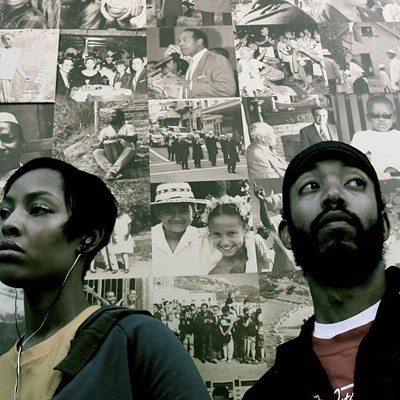What the Elephant 6 Collective is, in fact, is rather difficult to explain. E6 is a "recording company" that doesn't put out records; it's a "film" (Dusk at Cubist Castle) that is not meant to be finished or even shot; it's a group of people obsessed with Brian Wilson, the Beatles and home recording; it's several bands (Olivia Tremor Control, Neutral Milk Hotel, the Apples [in Stereo], etc.) who share a loose philosophy that, while unstated, is well understood by those who are a part of it.
What Elephant 6 ultimately stands for, simply put by Olivia Tremor Control's Bill Doss, is "a group of bands with similar ideals that like to work together." And it's in no small part thanks to E6 and cofounder Robert Schneider (of the Apples [in Stereo]) that we can be so readily graced with the raucous joy that the Minders provide in spades (like that Barton Fink feeling).
The Minders' story began in England with the birth of Martyn Leaper (I'm guessing sometime in the late '50s), who didn't know it at the time but would one day grow up to be a great pop songwriter. Then a whole lot of less interesting stuff happened (including Leaper's 10-jähr stint in Germany; jawohl!), until Martyn leaped across the "pond," landing in Denver for some unexplained reason. It was there he met Schneider and his nascent Apples, and presumably was thereupon initiated into the E6.
While in Denver, Leaper formed the Minders with ivory tickler/bass player Rebecca Coles and six-stringer savant Jeff Saltzman, and the band then signed with spinArt records. Its first "long" player (28 minutes!), Hooray for Tuesday (1998), was produced by Schneider and left no doubt that whatever the E6 Collective really was, the Minders were staunchly a part. Hooray is a minor pop masterpiece that sounds like XTC after a trip through an abbreviating device (would that such a thing existed), for almost all of the songs clock in at under two minutes. Phew! Bob Pollard seems expansive by comparison.
This aesthetic of brevity is no foolish consistency, however. After issuing a collection of early singles and previously unreleased tracks (Cul de Sacs and Dead Ends, 1999), the Minders made a departure of sorts with the somewhat more rockin' and heavier (next to previous Minders records only; Sabbath it ain't) Down in Fall EP (2000). It was a link in their progression from the sparse early singles to the guitar-hook heavy album tracks on Hooray to their current fully fleshed-out sound. It's almost as if Leaper's songwriting strained against the confinement of the earlier, lower-fi recordings, creating an interesting dynamic tension; on later work like Down in Fall and the most recent record, Golden Street, the songs explode all over as many tracks as are available.
This brings us to Golden Street, released in early '01. Leaving the necessary simplicity of previous records behind, Golden Street features an array of instrumentation/noisemaking that would make Todd Rundgren smoke a bong (but what wouldn't?). Everyone, it seems, has provided varieties of hand-clapping, along with guitar, piano, bass, percussion, violin, trumpet, tooth-brushing, television dialing and the album's secret weapon, Cole's harpsichord playing, which lends a Baroque flavor to the proceedings that may make you want to powder your wig. And get this--there are several songs longer than two minutes. Heretics!
Golden Street is exquisite pop the likes of which hasn't been heard since XTC's 1987 Rundgren-produced masterstroke Skylarking. In particular, Leaper's voice could easily pass for Andy Partridge's in a blind test. This is meant to be a tall compliment.
The band now resides in Portland, having tired of the gentrification of the Mile-High City. After the move, only the core of Leaper and Coles remained full-time Minders. In Portland, they added bassist Joanna Bolme to their lineup, however briefly. It seems Bolme was hi"jick"ed by none other than Steven Malkmus, who recruited her for his new band, the Jicks. There exists still a bit of bad blood over what the Minders saw as a poaching, and Malkmus, should he come to any Minders shows, will probably be on the "negative guest list."
In their adopted city they have established what they call "the Walk-in Closet Studio," built into their house with an eight-track recorder in the attic. This setup perfectly enables Leaper and Coles, who are married, to record while not slinging pizza pies. They work in separate pizza parlors that happen to be across the street from one another in Portland. They naturally have had to learn much more about microphones and recording equipment, but have more control over the specifics of their sound as a result. This could be a hindrance for a band with a bent toward perfectionism.
As Coles put it in an interview with Splendid, "Time is probably our biggest ally as far as getting songs to where we're happy with them." Their diligence, sometimes recording several demos of a song before finishing it, pays off. Each cut on Golden Street, in particular, sounds well-crafted in a way that many of the Minders' contemporaries' songs do not. Indeed, for some (like the aforementioned Pollard), too-prolific pop songwriting can often seem tossed off.
The Minders' proclivity in their live show is to create a sound that is as true as possible to the recordings. This means that the same instrumentation and vocal arrangements are generally used, but this can be prohibitive. "[Some] songs we're not even attempting to play--it just doesn't work. Others we just have to approximate," says Leaper in Splendid. "I think we're gonna ... try to plan to play everything live the way it was recorded."
If he's true to his word, the Minders' live set should have you dancing like Snoopy at suppertime.










